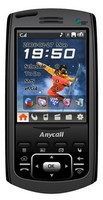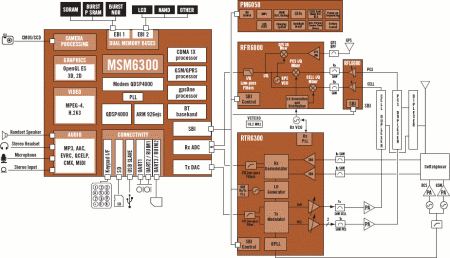Samsung ships Linux smartphone in China
May 8, 2006 — by LinuxDevices Staff — from the LinuxDevices Archive — 7 views Samsung has shipped a new Linux-based smartphone in China. The SCH-i819 targets Chinese business travelers, and is the first Linux phone to support dual-band cellular operation with both CDMA 1x (800MHz) and dual-band GSM (900/1800MHz) networks, according to Mizi Research, which supplied the phone's Linux stack.
Samsung has shipped a new Linux-based smartphone in China. The SCH-i819 targets Chinese business travelers, and is the first Linux phone to support dual-band cellular operation with both CDMA 1x (800MHz) and dual-band GSM (900/1800MHz) networks, according to Mizi Research, which supplied the phone's Linux stack.
 |
(Click to enlarge) |
The SCH-i819 appears to share the same “slider” hardware platform as the SGH-i858, a tri-band GSM phone that has already been submitted to the FCC to be approved for potential US distribution.
Hardware specifications
The phone functions of the SCH-i819 run on a Qualcomm MSM6300 communications processor, said to comply with CDMA2000 1X Revision A, GSM release 99 phase 2, GPRS class B multislot class 10, and GPS (global positioning system). The MSM6300 is based on an ARM926EJ-S core with memory management unit (MMU), and integrates dual QDSP4000 DSPs, along with a Jazelle Java accelerator. It runs Java and Brew, Qualcomm's proprietary mobile applications environment.

Qualcomm MSM6300 chipset architecture diagram
(Click to enlarge)
The applications processing side of the SCH-i819 runs Linux on an Intel PXA270 applications processor clocked at 416MHz.
The SCH-i819 has a total of 64MB of SDRAM, and 128MB of Flash, although how these amounts are divided between the two processing subsystems is not clear. User file storage is expandable through a micro-SD TransFlash card slot.
The SCH-i819 has a 2.4-inch, QVGA (240 x 320) color TFT touchscreen display with 65K colors, and a 2 megapixel CCD (charge-coupled device) digital camera. Networking options include Bluetooth, IrDA, and USB.
The SCH-i819 has an 1100 mAh battery, and measures 4.2 x 2 x 0.9 inches (107 x 52 x 22mm).
On the software side, the SCH-i819 runs Prizm 2.5, a Linux-based smartphone operating system stack developed by Mizi Research; refer to this story about the launch of Prizm 2.5 for more details.
This article was originally published on LinuxDevices.com and has been donated to the open source community by QuinStreet Inc. Please visit LinuxToday.com for up-to-date news and articles about Linux and open source.